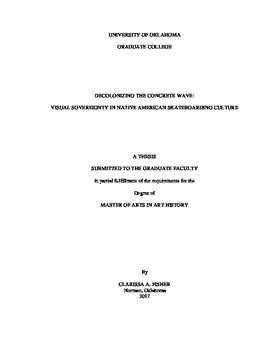| dc.description.abstract | This thesis focuses primarily on skateboard deck graphics and the cultural and political implications of skateboarding within the context of settler colonialism in the contemporary United States. It examines the intersection of skateboard deck graphics, appropriation, and the expression of Native American visual and geographical sovereignties. In the past decade, three important art exhibitions have highlighted the innovative ways in which Native American artists and skaters are combining art and skateboarding. These exhibitions were Remix: New Modernities in a Post-Indian World, curated by the staff at the National Museum of the American Indian in New York, Ramp it Up: Skateboard Culture in Native America, which ran from December 2009 until June 2010, also at the National Museum of the American Indian in New York, and Beat Nation: Art, Hip Hop and Aboriginal Culture, which opened at Vancouver Art Gallery in 2012. Artworks included in each of these exhibitions drew direct connections between skateboarding and Native American visual sovereignty.
Compared to other topics in art historical scholarship, careful studies of the visual and cultural aspects of skateboarding, and of skateboarding’s connection to Native American visual sovereignty, are relatively rare. Scholarly studies of skateboarding do exist, but their focus typically is not art historical, but rather medical, architectural, or sociological in scope. Iain Borden’s monograph, Skateboarding, Space and the City: Architecture and the Body, as well as scholarship by Becky Beal and Lisa Wiedman, interrogates contemporary constructions of the urban environment and authenticity in American skateboarding subculture, respectively. My thesis draws upon this scholarship, and incorporates the concept of visual sovereignty from the field of Native American art history. This concecpt, visual sovereignty, was first articulated in 1995 by Tuscarora artist and scholar Jolene Rickard to describe the intersection of political and geographical sovereignties and representations of Native peoples. I apply this concept to my own research in order to discuss the history of skateboarding, beginning with the Indigenous Polynesian origins of surfing, and the political and cultural valences of skateboarding within the context of contemporary settler colonialism in the United States. The issues, conflicts, and controversies surrounding land use and ownership in North American are always influenced by the history of settler colonialism: the entirety of the North American continent is by rights Indigenous land, and ongoing issues of political and geographical sovereignty are freighted with the history of genocide and dispossession that are the mechanisms of settler colonialism. These issues remain both relevant and urgent, and yet these issues are not thoroughly addressed in the current scholarship on skateboarding in the United States or in art historical discussions of skateboard deck graphics.
In this thesis, I argue that the cultural and artistic practices surrounding skateboarding – specifically the design of skateboard deck graphics by contemporary Native American artists, the creation of skate parks on reservation land, and the support of skateboarding among Native American youth by organizations such as The Stronghold Society – both expresses visual sovereignty and enacts land-based sovereignty within the context of North American settler colonialism. | en_US |
